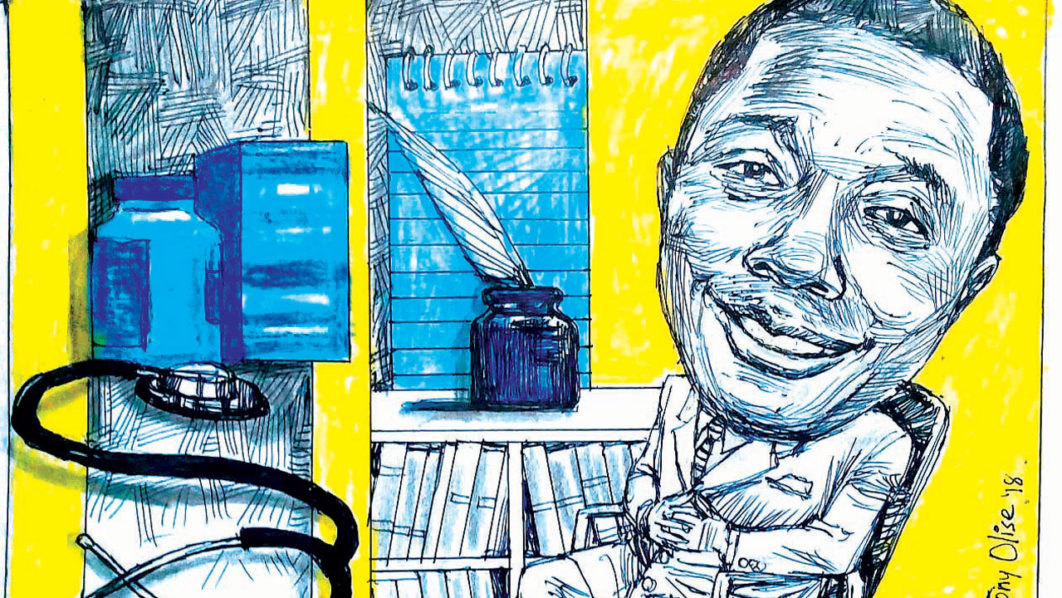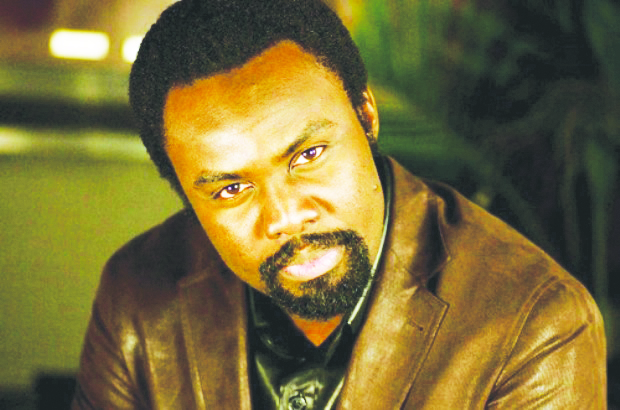
In every sane and forward looking society, the progenitors and harbingers of different traditions and social innovations are celebrated. Such honour is meant to motivate more productive thoughts, which are capable of stimulating inventive ideas that will impact positively on the socioeconomic and academic domains of any society. Pioneers or ground-breakers are heroes, in their own rights; and must be accorded the celebratory utterance, meant for champions. It is on this premise that this brief write-up is woven as a form of homage for Emmanuel Babatunde Omobowale, the first Professor of Literature and Medicine, in Nigeria. This tribute is timely, as it also heralds Professor Omobowale’s inaugural lecture titled ‘Literature and the Quest to Humanise Medical Practice in Nigeria’, coming up on November 1, 2018, at the University of Ibadan, where he started his academic career in 1995.
In 2011, I arrived in the sprawling and magnificent campus of the University of Ibadan, my dream university since childhood, for a Master’s degree in Literature. Though I had passed through the Delta State University, Abraka, where I was academically developed by seasoned scholars like Professor G.G. Darah and Professor Sunny Awhefeada, my cravings to be in the First and the Best was unquenchable! My contacts with Professor G. G. Darah and Professor Sunny Awhefeada (then Dr. S, as we fondly called him) in Abraka, intensified my longing for the Premier University. Both of them are great scholars, thinkers and motivators, trained in Ibadan. When I arrived at Nigeria’s premier University, I was enthralled by the research aptitude and the scholastic aura that pervaded the University as an academic climate.
At the Department of English, one of the courses that I registered for was called Literature and Medicine. Though I was exposed to other fascinating elective courses like Literature and the New Media and Literature and the Mind, it was Literature and Medicine that topped my list of courses that I found fascinating. One of the things which stunned me was the synergy and points of correlation that existed between these two seemingly disparate disciplines, Literature and Medicine. With regards to the person who was going to teach the course, I had imagined a highly bearded man of the Soyinkan generation, as the lecturer. Behold, the amiable and sociable Professor Emmanuel Babatunde Omobowale, who was in his early 40s, was the lecturer. Unlike many impatient, autocratic and temperamental teachers I had encountered, Professor Omobowale appeared calm, neat, calculated and humane.
He often harped on the importance of integrity and the need for each of his students to develop a sense of purpose and direction. He introduced us to different areas of Literature and Medicine – ethical issues, the narratives of diseases and healing as well as psychotherapy. I saw a mutual mentor in him, from the first instance, and I sustained this relationship which has now blossomed into fruition. Thus, I was extremely happy when he was appointed as the supervisor of my M.A. project which was in the area of Bibliotherapy. Professor Omobowale also supervised my Ph.D thesis which looked at the portrayal of mental disorders in selected literary texts from the different regions of Nigeria.
Professor Emmanuel Babatunde Omobowale, a native of Erin Oke, in Osun State, was born in Ibadan. Between November 2012 and August 2017, he served as the Head of Department of English, University of Ibadan. Professor Omobowale’s intellectual profundity is not in doubt. From the beginning of his career, he had distinguished himself as a great scholar, an innovative thinker and a very insightful administrator, who would, at specific instances, employ redemptive scholarship as well as administrative dexterity and ingenuity to humanise power and leadership. Omobowale attended Omolewa Nursery and Primary School, Oritamefa, Ibadan, for his primary school education. Between 1979 and 1984, he was at various times, a student at Government College, Ibadan, and Loyola College, Ibadan. In September 1984, he enrolled for his A’ Levels at Government College, Ibadan. After finishing Lower Six, in 1985, he gained admission to the University of Ibadan as an undergraduate student in the Department of English. Omobowale graduated with a Bachelor of Arts Degree in English from the University of Ibadan, in 1989, with a Second Class Upper.
The young Omobowale won the Departmental Prize and the First Heinemann Prize for Literature as the best graduating student in the Department of English, University of Ibadan. He was also nominated for the Faculty of Arts Prize for the best graduating student in the Faculty. Omobowale returned to the University of Ibadan, in 1991 and earned an M.A. in Literature in English, in 1992. He was also awarded a PhD degree in Literature and Medicine in 2001 by the University of Ibadan. Later, he proceeded to Case Western Reserve University, Cleveland, USA, where he obtained another M.A in Bioethics in 2003. The Bioethics postgraduate degree helped to broaden his knowledge on different aspects of the ethics of medicine.
When Omobowale started his academic career at the University of Ibadan in 1995, after a stint with the Heinemann Educational Books as an editor, I was sitting for my First School Leaving Certificate Examination in Baba-Ido Primary School, in Okwagbe. Similarly, when Omobowale was defending his Ph.D in 2001, I was sitting for my SSCE in St. Vincent’s College, Okwagbe in Delta State. These two episodes, to me, are not mere flukes – they significantly highlight the divine relationship between a mentor and his mentee!
Literature and Medicine, a discipline pioneered by Joanne Trautman-Banks, in Pennsylvania State University, in 1972, was introduced to the Nigerian academic landscape by Professor Omobowale in 2001. For centuries, the humanities and medicine had maintained a union. T. J. Murray, the former Dean of Medicine and Founder of the Medical Humanities Program, Dalhousie University, Canada, once noted that ‘there has to be a balance between the sciences and the humanities in medicine’. Literature and medicine, according to Ann Hunsaker Hawkins and Marilyn Chandelier McEntyre, ‘have a long history of cross-pollination’.
In the classical Greek society, Apollo is regarded as the god of medicine and poetry (McClellan and Jones, 1996) and Hippocrates, the Greek and Egyptian philosopher and physician, acknowledged as the father of medicine, as well as the originator of the “case note tradition” through which physicians record, comment or narrate their observation of patients’ ailments. The use of lyre by David to cure Saul of demonic spirits (1 Samuel, 16: 14-23) also confirms the psychotherapeutic quality of the arts on people. In African societies, traditional bards use song-poetry to heal depression and melancholia. Nketia is one notable African scholar in this regard, who believes in the therapeutic effects of music and dance (Nketia, 1962). A case in point is the healing potency of Ifa divinatory poetry of the Yoruba people, which has also been acknowledged by scholars of the Ifa tradition.
While the foregoing reveals a rather informal synergy between the humanities and medicine (of which literature is a constituent part), scholarly efforts to formalise the union between these literature and medicine is relatively recent. The origin of this collaboration, according to Ann Hudson Jones (1990: 22), began in the US: ‘Literature and medicine as a contemporary academic subspecialty is said to have began in 1972, with the appointment of Joanne Trautman Bank to the faculty of the Pennsylvania State University College of Medicine at Hershey. She was the first person with a Ph.D in literature to hold a full-time faculty position in medical school in this country (America) and probably the world’.
The appointment of Trautman Banks as the first full time Professor of literature at US medical school led to some dramatic changes that influenced the relationship between literature and medicine in countless ways. Since it was the first time a literary scholar was holding a position in a medical school, it was a revolutionary trend in the medical profession. As a Professor of Literature, Trautman-Banks employed literary approach to teach medical ethics; and this marked the turning-point in the medical curriculum of universities in the US, UK, Canada and Australia. The effort made to further establish a journal in the field, titled, Literature and Medicine in 1982 by Banks and Jones in collaboration with four other scholars help facilitate the rooting and budding of literature as a formal academic discipline. Other reputable journals like Lancet, Medical Humanities and many more have been established to help in its promotion across departments and faculties.
Literature and Medicine focuses on the symbiotic relationship between literary and medical knowledge, and it explores physical and mental conditions, the ethics of medicine as well as psychotherapy through literature (McLellan, 1996, 1997; Jones, 1996, 1997; Abse, 1998; Taylor and Kassal, 1998, Omobowale, 2001, 2008; Oyebode, 2002, 2009, 2012; Evans, 2003; Owonibi, 2010 & Kekeghe, 2018). The various domains of literature and medicine include creative works by physician writers, non-physician writers and patient-writers. In all of the categories above, focus is given to the exploration of human’s health experiences and the reconnection to a healing process. With the advancement of its curriculum and the establishment of relevant journals, literature and medicine has evolved as a discipline aimed at advancing the practice of medicine.
In line with the reconstruction of social and socialist reality, which is the hallmark of literary expression anywhere in the world, literature and medicine conveys experiences that border on diseases and healing through the deployment of effective dialogues and narratological resources aimed at humanising the practice of medicine. Concerted efforts have been made in Universities in Europe and North America to introduce literary courses to medical students, so as to have better clinicians, who are exposed to humane language and conducts. Literature and medicine helps to stimulate a humanistic approach to physician-patient relationship. This is why Omobowale notes that literature “assists in making medicine a more people-oriented and outward looking profession” (p. 15). Professor Omobowale has, therefore, made a strong case for the inclusion of the medical humanities in the curriculum of Nigerian medical schools.
It is worthy of note that, while some scholars have been promoting the discipline of literature and medicine by way of digressive references, in class interactions, the University of Ibadan is the only institution in Nigeria where it is currently studied as a course. It is also commendable that Medical Humanities is currently gathering some momentum in the University of the Witwatersrand, South Africa. If Ibadan and Wits are the only Universities we can authoritatively boast of in Africa, as far as Literature and Medicine is concerned, much more efforts must be intensified for its advancement and promotion in Nigeria.
Unlike the situation in Africa, the field of literature and the medical humanities has been made prominent both at the undergraduate and postgraduate levels in a good number of Universities in Europe and North America such as Pennsylvania State University, Hershey, USA, University of Pennsylvania, Philadelphia, USA, Johns Hopkins University, Baltimore, USA, Case Western Reserve University, Cleveland, USA, University of Utah, USA, King’s College, London, UK, The University of Edinburgh, UK, University of Birmingham, UK, University of Warwick, UK, Dalhousie University, Nova Scotia, Canada, University of Toronto, Canada, The University of Sydney, Australia and many other universities in Euro-America. Femi Oyebode reveals that “the argument for including the humanities within undergraduate medical curricula has in the main been won”; adding that in “the USA, where medicine is studied as a graduate subject, a substantial proportion of students come into medicine after a first degree in the liberal arts” (Oyebode, 2009: p. 224).
Omobowale’s thesis, ‘Literature and Medicine: a Study of Selected Creative Works of Nigerian Physicians’ (2001) remains a ground-breaking study in Nigeria on what Literature and Medicine entails. In this thesis, Omobowale (2001) embarked on a systematic exploration of the social vision in literary works of selected Nigerian physician-writers such as James Ene Henshaw, Anezi Okoro, Latunde Adeku, Wale Okediran, Tolu Ajayi, Femi Oyebode and Martin Akpaa, highlighting the medical ideas foregrounded in their creative writings.
The use of felicitous language in patient-doctor relationship, the vision of positive social change as it applies to the health industry and the creation of social awareness on the predominance of diseases are some of the common subjects that constitute the texts examined in Omobowale’s thesis. This interdisciplinary oriented thesis marks the beginning of the field of Literature and Medicine in Nigeria. One remarkable achievement, in that regard, is the offering of Literature and Medicine in the Department of English of the University of Ibadan as an elective course for M.A. students of literature. This has engendered a lot of interests in students that passed through Omobowale’s medical humanities classes.
As a pioneer scholar on the interaction between the medical and literary disciplines in Nigeria, Omobowale’s thesis and research scope have inspired other scholars, who have also domiciled their research compass within the ambits of Literature and Medicine. Sola Owonibi’s ‘Patient-Writers’ Portrayal of Disease and Psychological Trauma’ (2010) and Stephen Kekeghe’s ‘Psychiatric Conditions in Selected Nigerian Literary Texts’ (2018) are doctoral theses motivated by Omobowale’s pioneering academic activities. Joseph Mayaki, another of Omobowale’s doctoral student, is currently carrying out a study on scriptotherapy, which is an aspect of writing-cure. Also, since 2005, more than 50 M.A projects, in the Department of English, University of Ibadan, have been inspired by Omobowale’s classes on the pedagogical relationship between literature and the medicine. Some of them, like Femi Eromosele and Shakiru Adebayo, are currently pursuing their PhD programmes in areas of studies that are closely aligned to Literature and Medicine in universities, abroad. Currently, Professor Omobowale is supervising 7 PhD students in the area of Literature and Medicine.
Professor Omobowale’s contributions to the growth of Literature and Medicine, in Nigeria, are evident in the many articles, essays, sponsored researches and creative works that he has published. His play, The President’s Physician, celebrates the ethics of medicine through the appropriation of incisive dialogues, socially convincing characters and situations. The play centers on Doctor Bituki Warunga, a personal physician to a fictional African dictator, General Kalunga Ntibantunganyah. Warunga finds himself in an ethical dilemma, as he ruminates on whether to kill or save the life of his autocratic and eccentric boss.
Using the principles of medical ethics, as propounded by Hippocrates, as the basis of his ruminations, Warunga acknowledges that it would be unethical for him to exterminate General Kalunga Ntibantunganyah, on account of his draconian rule, since his duty, as the president’s physician, is to ensure that the President continues to stay healthy to discharge his official functions, either negatively or positively. The play is anchored on the core tenets of medical ethics, which are: beneficence, patient autonomy, physician competence and responsible use of power. Also, Omobowale’s well-written short story, ‘Canadian Blues’, which is set in Canada and Nigeria, focuses on the health industry and on issues like the deployment of adequate manpower in healthcare institutions and infrastructural development that impact positively on medical practice. In all his creative works, Omobowale believes that literature is an instrument for positive social change. The Eagle Must Fly and Others Stories (1992), The Melting Pot (1993), Seasons of Rage (1997) An Eye for an Eye (2001) give an eloquent testimony to Omobowale’s socialist and redemptive vision.
It is pertinent to review some of Professor Omobowale’s articles and essays on Literature and medicine— this will connect us to his research trajectory as a Professor of Literature and medicine in Nigeria. In Omobowale’s article, ‘Literature and Medicine in Nigeria: A Case for a New Discipline’ (2008), he argues that literature and medicine as a specialty, should be institutionalised in Nigeria, bearing in mind, its domains and curricula as well as its relevance in humanising medical practice in Nigeria. It is this idea that is foregrounded in another of his article, titled, ‘The Neurosurgeon as a Humanist: The Humanism in Latunde Odeku’s Whispers from the Night’ (2007), which x-rays the humaneness that literature offers physicians and medical students. Thus, in ‘The Physician as a Writer: A Study of the Novels of Wale Okediran’ (2006) and ‘Literary Physicians: Nigerian Medical Students, Medicine and the Art of Creative Writing’ (2009), Omobowale unfolds the benefits of introducing literature to medical students. The effort to reveal the beneficial point between medicine and literature informed the series of interviews which Omobowale had with physician-writers across Nigeria, one of which informed his article, ‘The Scapel and the Pen: Conversations with Two Pioneer Nigerian Physician-Writers’ (2011).
Omobowale’s studies above are in agreement with Martyn Evans’ essay, ‘Roles for Literature in Medical Education’ (2009), which underscores the various benefits of including literature and the humanistic disciplines in medical education and its corresponding effects in clinical practice. Furthermore, in ‘Literature and the Teaching of Biomedical Ethics in Nigeria: A Creative Writer’s Perspective’ (2006) and ‘The Therapeutic Relationship: A Critical Appraisal’ (2003) he examines the dynamics of patient-physician relationship and the four central concepts of bioethics, namely, respect for the autonomy of patients, beneficence, justice and non-maleficence. In ‘Aging in Nigerian Literature: James Ene Henshaw’s The Jewels of Shrine’ (1999), Omobowale highlights the gradual physical and mental degeneration which old age engenders as well as the lonesomeness that the old are subjected to. The article suggests humaneness and respect for the aging members of the society, which will have a positive impact on their physical and mental wellbeing.
In ‘Greed and Ambition-Induced Psychiatric Features in Femi Osofisan’s The Restless Run of Locust and Muyiwa Ojo’s Memoirs of a Lunatic’ (2018), Omobowale and Kekeghe carry out a literary-diagnosis of manic depression and schizophrenic psychosis, which are triggered by greed and obsession with political power. The literary depiction of mental condition in literature also resonates in Omobowale’s and Adebayo’s (2018) ‘Negotiating War, Trauma and the Banality of Evil: Narrative Aesthetics and the Representation of PTSD in Beasts of No Nation’ which examines war-induced Post-Traumatic Stress Disorders (PTSD) in Uzodinma Iweala’s novel, Beasts of No Nation’. These two essays and others expand the scope of literature and medicine in Nigeria through a close reading of mental illnesses in literature. Professor Omobowale is currently writing a follow up to a paper that he published in 2009 on the ethical implications of inserting human genes into plants. The new paper is looking at the impact of GMO foods in sub-Saharan Africa. He is conducting the research from the perspective of a Bioethicist and it is slated for submission to a reputable, international journal. There are many more articles and essays by Professor Omobowale in reputable journals and books, which x-ray the positive interactions between the humanities and the medical discipline.
Omobowale has received reputable awards and scholarships in recognition of his unrelenting efforts on the promotion of Literature and Medicine in Nigeria. Twice, in 2003 and 2010, Professor Omobowale was a recipient of the University of Ibadan’s Senate Research Grant. In 2002, he was awarded the Fogarty Fellowship, which facilitated his training as a Bioethicist at Case Western Reserve University, Cleveland. Between 2006 and 2008, he was a Postdoctoral Fellow at the Mclaughlin-Rotman Centre for Global Health, which was affiliated to the University of Toronto, Canada. Given his intellectual depth and display of humane integrity, Professor Omobowale has served and continues to serve as an External Examiner for many Universities in Nigeria such as the University of Lagos, Adekunle Ajasin University, Akungba-Akoko, Covenant University, Ota, Bowen University, Iwo, Redeemer’s University, Ede and the Obafemi Awolowo University, Ile-Ife.
Besides teaching, research and community service, Professor Omobowale has successfully supervised 10 doctoral students and over 80 masters’ students, many of whom worked on Literature and Medicine. The following are the doctoral students produced by Professor Omobowale, who are excelling in their respective careers: Dr. Sola Owonibi who is Associate Professor, Dr. Kayode Ogunleye, Dr. Kazeem Adebiyi-Adebalu, Dr. Solomon Edebor, Dr. Stephen Kekeghe, Dr. Mary Aiyetoro, Dr. Thomas-Michael Chukwumezie, Dr. Nureni Fadare, Dr. Charles Feghabo and Dr. Chukwuemeka Ekwuribe. Professor Omobowale, no doubts, is a mentor to many. The effort made by Professor Omobowale to introduce literature and medicine in Nigeria is grand. He is a pioneer and an innovative scholar, who is worthy of celebration!
•Dr. Stephen Kekeghe teaches in the Department of English, College of Education, Warri.
[ad unit=2]






